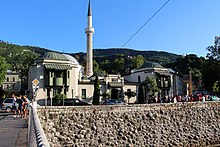Emperor's Mosque
This article needs additional citations for verification. (October 2014) |
| Emperor's Mosque | |
|---|---|
 A view of Emperor's Mosque from the Emperor's Bridge | |
| Religion | |
| Affiliation | Sunni Islam |
| Location | |
| Location | Sarajevo, Bosnia and Herzegovina |
| Geographic coordinates | 43°51′27″N 18°25′49″E / 43.85750°N 18.43028°E |
| Architecture | |
| Type | Mosque |
| Style | Ottoman architecture |
| Completed | 1457 / 1565 |
| Specifications | |
| Capacity | 500 |
| Dome(s) | 1 |
| Minaret(s) | 1 |
| Website | |
| www | |
The Emperor's Mosque (Bosnian: Careva džamija, Turkish: Hünkâr Camii) is an important landmark in Sarajevo, Bosnia and Herzegovina, being the first mosque to be built (1457) after the Ottoman conquest of Bosnia. It is the largest single-subdome mosque in Bosnia and Herzegovina, built in the classical Ottoman style of the era.[1]
It was built by one Isaković-Hranušić who dedicated it to the Sultan, Mehmed the Conqueror, the conqueror of Constantinople. Considered one of the most beautiful mosques of the Ottoman period in the Balkans, the mosque features a roomy interior and high quality decorative details, such as the mihrab.
History
The original mosque was built in the mid-15th century. Damaged and totally destroyed by the end of that century, it was rebuilt in 1565 and dedicated this time to Suleiman the Magnificent.
The first mosque was made of wood and significantly smaller than the existing building that was built in 1565. Side rooms were added in 1800 and connected to the central prayer area in 1848. Between 1980 and 1983, the painted decorations in the interior of the mosque were conserved and restored. The burial ground (graveyard) beside the Emperor's Mosque contains the graves of viziers, mullahs, muftis, sheikhs, the employees in the Emperor's Mosque, along with other prominent figures living in Sarajevo.
The mosque was damaged during World War II but mostly in the wars during the 1990s, and renovation work is pending.
The first settlements in Sarajevo were built around the mosque with the residence of the Sultan's representatives than being built next to the mosque. Isa-bey also built a hammam (public bath) and a bridge that led directly to the mosque. This bridge was disassembled during the Austro-Hungarian government and rebuilt just a few meters upstream where it still exists today.
On the other side of the river, he built a caravanserai. For the financing of these facilities, Isa-bey left a heritage of many shops, land and properties.
Gallery
-
A view of Emperor's Mosque before the 2020 renovations
-
A view of the main building, dome and minaret from Konak street (after 2020 renovations)
-
A look at one of the mashrabiyas made in Bosnian fashion at the front of the mosque
-
Another view of the riwaq
See also
- Timeline of Islamic history
- Islamic architecture
- Islamic art
- List of mosques in Europe
- List of mosques in Bosnia and Herzegovina
- Islam in Bosnia and Herzegovina
References
- ^ Kenan Torlak - B online (2011-07-03). "The Emperor's Mosque in Sarajevo - The Mosque of Sultan Süleyman the Lawgiver - Magazine". Islamic Arts Magazine. Archived from the original on 2012-03-09. Retrieved 2014-08-26.









